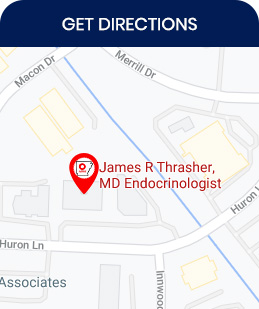Thyroid Cancer Treatment Specialist in Little Rock, AR
Thyroid cancer is a rare type of cancer that affects the thyroid gland, a tiny gland near the base of the neck. Thyroid cancer, a kind of endocrine cancer, is generally highly curable and has a high recovery rate. Early signs and symptoms of thyroid cancer include chronic hoarseness or other vocal abnormalities, difficulty swallowing, difficulty breathing, and a chronic cough that is not caused by a cold. If you or someone you know has recently been diagnosed with thyroid cancer, visit us at the Arkansas Diabetes and Endocrinology Center for the proper treatment. For more information, contact our office to schedule an appointment. We are conveniently located at 11400 Huron Lane, Little Rock, AR 72211.


Table of Contents:
What are the first symptoms of thyroid cancer?
What can be mistaken for thyroid cancer?
What is the number one cause of thyroid cancer?
What is the survival rate for thyroid cancer?
What is the treatment for thyroid cancer?
At its onset, individuals with thyroid cancer may not exhibit any initial symptoms. However, as it progresses, it can lead to a variety of signs and symptoms, including neck swelling, alterations in voice tone, and difficulties in swallowing.
Frequently, thyroid cancer is identified during routine neck examinations or through imaging scans conducted to diagnose other medical conditions. The most prevalent early indication of thyroid cancer involves the presence of an unusual lump, nodule, or enlargement in the neck area.
Individuals who detect the appearance or growth of a new lump should promptly consult a medical professional. Additional tests can be conducted to determine the cause and if it constitutes a tumor.
Although the majority of thyroid nodules are usually non-cancerous, it’s crucial to have any unusual growths assessed by a healthcare provider. Fatigue often emerges as one of the initial physical symptoms in patients with thyroid cancer as well. Other symptoms typically arise only after the condition has progressed to an advanced stage.
Given the proclivity of thyroid conditions to present with enlargements or lumps in the thyroid, a number of them can be mistaken for thyroid cancer. This makes proper diagnosis through an examination and a biopsy imperative in checking for thyroid cancer.
Thyroid nodules, for instance, are non-cancerous growths that can present in the same area as thyroid cancer. Goltier also causes significant swelling in the neck and is similarly mistakable. Other conditions such as Hashimoto’s thyroiditis or hypothyroidism can also cause symptoms that overlap with thyroid cancer.
What’s more, is that certain thyroid conditions capable of mimicking the signs of thyroid cancer can actually increase a patient’s risk of developing thyroid cancer over time.
While several inherited conditions have been associated with thyroid cancer, the precise primary cause of most cases is unknown. Alterations in an individual’s DNA can prompt the transformation of thyroid cells into cancerous ones.
Certain risk factors can increase the likelihood of thyroid cancer, such as for individuals with particular benign thyroid conditions. For those with a history of benign breast conditions, the risk of thyroid cancer doubles in comparison to those without such a history.
Being overweight also escalates the risk of thyroid cancer compared to individuals of lower weight. Additionally, a familial history of thyroid cancer can heighten an individual’s vulnerability to the disease.
The survival outlook for thyroid cancer depends on the specific type and stage of the cancer at the time of diagnosis among a host of different factors.
The stage of the cancer refers to its size and extent of spread. Generally, a more favorable outcome is associated with early-stage cancer. Alongside the stage, the type of tumor is a crucial factor in predicting the prognosis of thyroid cancer.
Age also plays a role in determining survival probabilities. Younger individuals tend to experience better survival rates compared to older individuals. Additionally, the presence of other medical conditions can impact both the available treatment options and the likelihood of survival.
To accurately assess your prognosis, a doctor who is knowledgeable about your medical history, the characteristics of your cancer, and treatment must consider all these factors.
Papillary thyroid cancer is the most prevalent form of thyroid cancer. In cases where papillary thyroid cancer is confined to the thyroid gland and has not spread beyond, the 5-year survival rate is nearly 100%. Nonetheless, survival rates can vary, making early detection and prompt treatment for all types of thyroid cancer paramount.
Thyroid cancer treatment aims to either cure the cancer or control its growth. If it’s possible to cure, the goal is to remove or destroy as much of the cancer as possible.
A personalized treatment plan is created based on your health and the type of cancer you have. Surgery is a common approach, where your thyroid gland might be partially or completely removed. The specific surgery depends on the type and size of the cancer, as well as whether it has spread to nearby lymph nodes.
Thyroid cancer is often treatable, however, survival rates can vary, making early detection and prompt treatment for all types of thyroid cancer paramount. A personalized treatment plan is created based on your health and the type of cancer you have. Thyroid cancer treatment is available at Arkansas Diabetes and Endocrinology Center. For more information, contact our office to schedule an appointment. We are conveniently located at 11400 Huron Lane, Little Rock, AR 72211. We serve patients from Little Rock AR, Conway AR, North Little Rock AR, Pine Bluff AR, Hot Springs AR, Benton AR, Sherwood AR, Russellville AR, Jacksonville AR, Cabot AR, Searcy AR, Bryant AR, Jonesboro AR, Forrest City AR, Magnolia AR, Camden AR, Malvern AR, Batesville AR, Arkadelphia AR, Clarksville AR, Monticello AR, Heber Springs AR, Morrilton AR, Stuttgart AR, Greenbrier AR, Sheridan AR and Vilonia AR.







